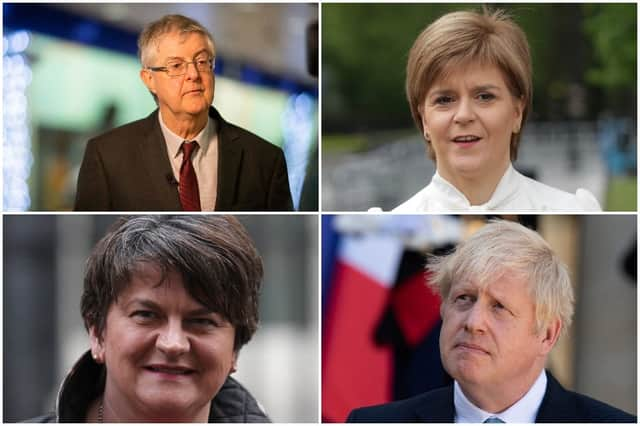How the new lockdown rules differ across the UK - everything you need to know


Following conference calls between the Prime Minister and the leaders of each of the devolved nations earlier this week, a raft of new restrictions aimed at bringing down the rate of coronavirus infections have been announced. These include harsher penalties for breaking the rules, and a 10pm curfew for pubs, restaurants and cafes.
But Mr Johnson’s announcement applied to those in England, and some of the measures he announced differ to what Nicola Sturgeon, Mark Drakeford and Arlene Foster have mandated for each of their respective countries.
Advertisement
Hide AdAdvertisement
Hide AdHere are all of the new rules explained, no matter where in the UK you live.
Socialising
One of the main differences at this stage is in whether people are allowed indoor visits to other households.
In England, it’s still fine to socialise indoors with people from other households, so long as you’re maintaining the rule of six and social distancing where necessary.
The same goes in Wales, but the people must be part of an ‘extended household’.
Advertisement
Hide AdAdvertisement
Hide AdBut in Scotland and Northern Ireland, indoor visits to other people’s houses are now banned, with First Minister Nicola Sturgeon telling the Scottish public yesterday, “Please don’t meet people in their homes or your home - because that is where the virus often spreads.”
The new general restrictions don't supersede measures which have been introduced in specific areas, such as in Merseyside, Warrington, Halton in Cheshire, Lancashire (excluding Blackpool), Wolverhampton, Oadby and Wigston in Leicestershire, and Bradford, Kirklees and Calderdale in West Yorkshire.
In West Yorkshire and the Midlands, the restrictions mean no socialising outside your household or social bubble for the time being.
The same applies in Merseyside, Warrington, Halton and Lancashire, where a 10pm to 5am curfew for hospitality businesses had already been announced, with added advice not to use public transport unless necessary or attend sporting events as spectators.
Advertisement
Hide AdAdvertisement
Hide AdThese are separate again to the local lockdowns which have been brought in for certain areas in the North East, Greater Manchester, Birmingham and Leicester.
Pub curfews
Following the new restrictions announced on 22 September, a new 10pm to 5am curfew will be mandatory across the hospitality sector in England, Wales and Scotland, with pubs told they must be shut by 10pm, not offering last orders at that time.
At present, the devolved government in Northern Ireland is still weighing up its decision on whether to follow the rest of the UK’s lead on this.
Working from home
No matter where you are in the UK, the official advice as it stands is that you should work from home if possible.
Advertisement
Hide AdAdvertisement
Hide AdWhile Boris Johnson’s government did spend several weeks encouraging the public to return to offices in order to restart the economy, in his speech on 22 September he clarified that, due to rising case numbers, workers should continue to work from home if they can, for the foreseeable future.
Weddings and funerals
For those planning weddings, it might be worth considering the different number of guests allowed to attend in each part of the UK.
While in England a maximum of 15 guests will be allowed at both ceremonies and receptions as of 28 September, in Wales you are still allowed 30 people, and 20 in Scotland.
In Northern Ireland, the exact number depends on the individual venue’s risk assessment.
Advertisement
Hide AdAdvertisement
Hide AdThe same considerations might well apply for funerals, too. While the levels of attendance allowed for funerals has been set at the same level as weddings in Scotland, Wales and Northern Ireland, in England the original limit of 30 people is still in effect.
Travel
The UK Foreign Office has been updating its guidelines on which destinations are safe to travel to, and from which ones returning travellers will be required to self-isolate, though blanket bans on international travel haven’t as yet become policy in the UK.
But, speaking yesterday, Nicola Sturgeon was the first UK leader to explicitly ask the public not to book holidays in October. She said, "Please think of the October break as an opportunity to further limit social interaction. And, given that this is a global pandemic, please do not book travel overseas for the October break if it is not essential."
In terms of domestic travel, the Welsh First Minister Mark Drakeford has publicly appealed for people to “think carefully about making journeys”, making Wales the only nation of the UK in which the public are currently being officially encouraged to only travel when necessary.